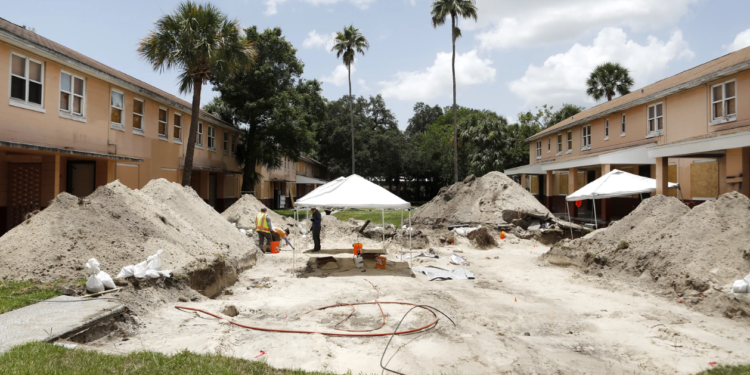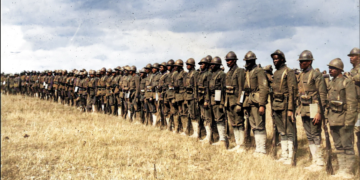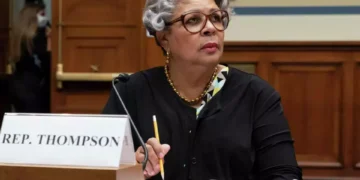March 3, 2025 Story by: Editor
In the early 20th century, Clearwater Heights, Florida, was a flourishing Black community, deeply rooted in faith and pride. However, due to segregation in the South, African Americans were barred from staying in White hotels, walking on the beach, or swimming in the bay. Even in death, they were buried in separate cemeteries.
These burial grounds were sacred—until their land became valuable. By the 1950s, headlines revealed that Clearwater officials had struck a deal to relocate a “Negro” cemetery, with hundreds of African American graves being moved to make way for a swimming pool. Another Black cemetery was set to be displaced for a department store. But O’Neal Larkin vividly remembers the moment he realized something was terribly wrong.
“It’s not an imaginary thing that I seen. It’s what I seen with my own eyes,” Larkin told 60 Minutes correspondent Scott Pelley.
Now 82, Larkin recalls witnessing construction workers in 1984 digging a trench through what was supposed to be a “relocated” Black cemetery.
“But I remember the parking lot where the engineers—traffic engineer was cutting the lines through,” he said. “And they cut through two coffins. That was my first knowledge of seeing it because I walked out there, and I seen it myself.”
In 2019, the Tampa Bay Times exposed the fate of many segregated cemeteries in Florida—paved over and forgotten. In response, the city of Clearwater sought to uncover the truth.
Rebecca O’Sullivan and Erin McKendry, archaeologists from Cardno, were hired to map the desecration.
“These individuals were loved. They were family members; they were fathers and mothers,” McKendry told Pelley. “And they were interred with love.”
“People deserve to be treated with respect,” O’Sullivan added. “That’s the most important thing.”
Using ground-penetrating radar, the team examined a site that had once been a segregated cemetery, now an office property. Their findings revealed 328 likely graves—many beneath a parking lot, some possibly under the building, and more beneath South Missouri Avenue. Records indicated the cemetery once contained 550 graves, yet only 11 had been documented as relocated in the 1950s.
“So there may be hundreds of bodies still at that site?” Pelley asked.
“It’s possible,” O’Sullivan replied.
Nearby, the archaeologists investigated another former Black cemetery. In the 1950s, instead of integrating the White community pool, the city decided to relocate hundreds of bodies to construct a Black swimming pool and school.
“But the bodies were not removed,” McKendry said.
In 2023, Cardno confirmed this through excavation. A prayer was offered at the site before they sifted through layers of sand, searching for grave markers or tributes. Human remains were inevitably uncovered—teeth at the office site, bones at the school, which had closed in 2008.
“All of the information and the data that we collected does indicate that there are additional burials likely below the footprint of that school building,” McKendry said.
Larkin, watching the excavation, imagined what must have happened when the school was built in 1961.
“To dig the foundation to put this school upon,” he said. “They had to hit some form of remains.”
Some families may not have been able to afford tombstones, but archaeologists found evidence of grave markers.
“This is a marker that would’ve been used initially after the burial if a stone was not ready to be placed. And in some cases, this is all that would’ve been used to mark the location of a burial,” McKendry explained.
Among the artifacts Cardno documented was a dime from 1942, likely left as a tribute to the deceased.
“We also found this brass wedding ring at approximately the same location and the same depth as the dime,” McKendry said.
The disturbed remains and artifacts were carefully reburied at the site, awaiting a decision on the next steps.
Anthropologist Antoinette Jackson, who leads the African American Burial Ground Project at the University of South Florida, is compiling a database of desecrated cemeteries.
“Not just Clearwater, it’s nationally from New York, all the way out toward Texas, and all the way down to South Florida where these cemeteries had been built over—erased, marginalized, underfunded, and need support in order to make them whole and have this history known,” Jackson told Pelley. “This is not an isolated story, unfortunately.”
So far, Jackson has identified around 70 lost Black cemeteries across the U.S., buried under housing developments, highways, and even the county-owned parking lot of Tropicana Field, home to baseball’s Tampa Bay Rays.
“What we want to bring forward is the memory, the knowledge that these sites were there, these places, these cemeteries, these families were there, lived, died, worked, contributed to our country, to their communities, to our hometowns,” Jackson said.
Pelley asked, “Is there evidence of White cemeteries being lost, abandoned, forgotten in the way that these are?”
“There are abandoned cemeteries across the board,” Jackson acknowledged. “There are cemeteries that are not only African American cemeteries or Black cemeteries that have been in some way desecrated, but the issue is more acute with Black cemeteries because of issues like slavery, segregation, in which this particular community were legally and intentionally considered lesser than or marginalized by law.”
In Clearwater, officials are debating how to honor those buried beneath the school, South Missouri Avenue, and the FrankCrum Company, which unknowingly built its headquarters on the cemetery decades after its erasure.
“I’m sure that, when they purchased that property, they didn’t know that there were bodies there,” said Zebbie Atkinson, president of the Clearwater NAACP.
When asked about potential objections to disturbing businesses and roads, Atkinson responded, “I would say that that’s not their call. They have no family buried there.”
Atkinson is working with descendants, city leaders, and businesses to determine the next steps.
“Some people want to have the bodies moved to a place where they can properly memorialize them. Some of the descendant community wants to let the people stay where they are. Those are the type of things that need to be worked out,” Atkinson said. “We have to sit and talk about it. I mean there is no easy answer with that.”
Clearwater is investing $270,000 to uncover the truth, seeking a resolution that honors the dead. The FrankCrum Company has expressed interest in being part of the solution, with proposed ideas including monuments. However, for some, like Larkin, there’s only one acceptable course of action.
“Tear it down,” Larkin told Pelley. “Tear down that building, as far as I’m concerned. Tear the school down. Make it a shrine of memories so that people can go and use it in a proper way of remembering. To treat ’em with more dignity than what this has been treated.”
Pelley noted the stark contrast in how dignity was upheld in White cemeteries in Clearwater. One cemetery featured a Confederate soldier’s monument, draped with a fresh banner of racism. And when a planned road threatened its location, officials designed a respectful detour around it.
As for those buried in the Black cemeteries of Clearwater, only a few have documented images—Reverend Arthur L. Jackson, Reverend Joseph Hines, and Mack Dixon Sr., who was laid to rest alongside his wife, three children, and two grandchildren. The identities of the remaining 500 souls remain unknown, their memories lost to time and segregation.
Source: CBS News
















